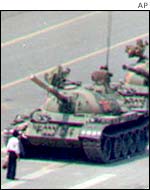Fifteen years ago the world recoiled at images of China's brutal crushing of student protest. The Chinese put 21 of the leaders on a most wanted list. Some are still defiant, others have fled the country, most pursue studies and careers in the US. (Times Newspapers Ltd., 06/03/04.)
Go to China Support Network and read about one of the individuals mentioned in the above article. Zhang Ming is hunger striking in a prison in Shanghai. Another person mentioned in the Times Online article is Wuer Kaixi ("the pundit"). BBC did an interview with him on May 28. Here is an excerpt:
The student movement of course wanted to achieve political aims. Our expectations at the time ware quite clear and definite.
We wanted legal recognition of the student organisation, we wanted an organisation in China similar to the trade union Solidarity in Poland, which could become a platform for promoting democracy in China, for promoting multi-party politics and for promoting freedom of speech as well as a series of other democratic developments in China.
Here is the last paragraph of a resolution by Rep. Christopher Cox (Republican, California):
Today, on a bipartisan basis, Congress stands united in support of freedom for the people of China. Fifteen years ago, Tiananmen Square marked not only a tragedy, but a decisive turning point in the fight for freedom. People's Liberation Army troops won the battle against the Chinese people that day, but they will surely lose the war to imprison the human spirit -- because we will never forget. The day will soon come when all of the Chinese people will have the right to speak and debate freely. The hope symbolized by the Goddess of Democracy will ultimately triumph. (We Will Never Forget, Tech Central Station, 06/04/04.)
[Editor's comment: I wonder who voted against the resolution (400-1)...]
Here is a great quote from The Washington Times' editorial:
Appeasement-oriented Sinophiles have an original way of looking at today's anniversary. They argue that the 1989 crackdown actually aided the cause of democracy because Beijing is afraid of the international backlash similar repression would cause today. If anything, the opposite is true. Increased business and diplomatic relationships after Tiananmen and during Hong Kong and Taiwan hostilities signal that the world isn't interested in interfering in Chinese affairs. (The Washington Times, 06/04/04.)
Lev Navrozov paints a scary scenario in his article, The Tiananmen Square Massacre and China’s Top-Notch Weapons of Future Warfare.
The communist dictators did not only crush the protest at the Tiananmen Square, they have also clamped down on protesters on the web. Related: My posts, REMEMBER TIANANMEN SQUARE 06/04/89 and BLOGSPOT SITES BANNED IN COMMUNIST CHINA.

(Image source: BBC News / AP.)

No comments:
Post a Comment